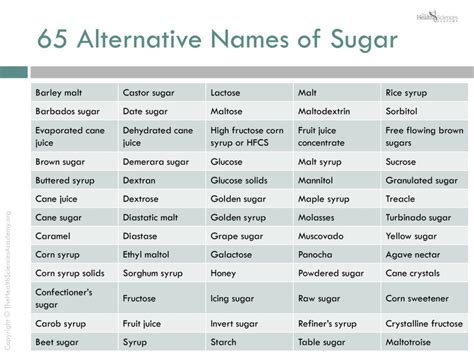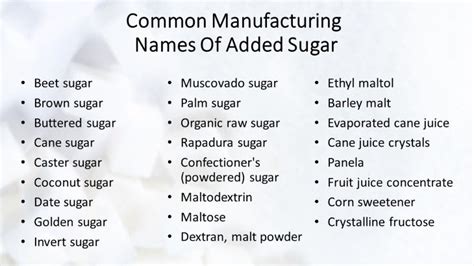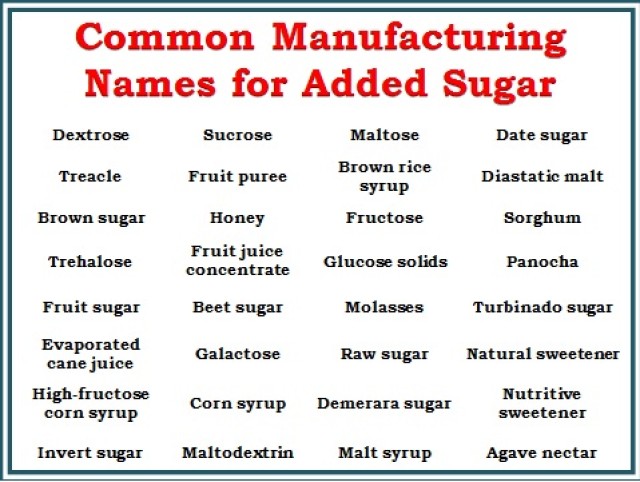Added sugars have become a significant concern in today’s diet, contributing to various health problems. Unlike naturally occurring sugars found in fruits and dairy, added sugars are those introduced during food processing or preparation. They are often hidden in everyday items like beverages, snacks, and sauces, making it easy to exceed recommended limits without realizing it. This guide will explore the types of added sugars, common dietary sources, and the recommended daily intake. It will also delve into the health risks of excessive sugar consumption, including weight gain, heart disease, diabetes, and dental issues. Additionally, we’ll provide practical tips for identifying hidden sugars on food labels and reducing your sugar inta
zopmj.com will lead an exploration of this topic in detail.
1. Definition and Types of Added Sugars
Added sugars are sugars or sweeteners that are put into foods and drinks during production or cooking. Unlike the natural sugars found in fruits, vegetables, and dairy products, added sugars have no essential vitamins or minerals. Their main purpose is to make things taste better or last longer. Some common examples of added sugars are white sugar (sucrose), brown sugar, high-fructose corn syrup, honey, molasses, and different syrups such as maple or agave.
Hidden sugars lurk in everyday foods, from obvious culprits like sodas, desserts, and candies, to less obvious sources like salad dressings, bread, and pasta sauces. It’s crucial to distinguish between natural and added sugars, as added sugars significantly boost calorie content without providing any nutritional benefits. Excessive intake of added sugars can contribute to various health problems, highlighting the importance of monitoring consumption and being aware of the types of sugars present in our diet.

2. Common Sources of Added Sugars in the Diet
Added sugars are found in a wide variety of foods and beverages, many of which might surprise you. The most obvious sources include sugary drinks such as sodas, energy drinks, and sweetened teas, which often contain large amounts of high-fructose corn syrup or sucrose. Desserts like cakes, cookies, pastries, and ice cream are also loaded with added sugars to enhance flavor and texture.
However, added sugars can also hide in everyday foods that aren’t typically considered sweet. For instance, breakfast cereals, flavored yogurts, granola bars, and even seemingly healthy snacks often contain added sugars to improve taste. Condiments such as ketchup, barbecue sauce, and salad dressings can be unexpected sources of sugar as well.
Processed and packaged foods, including breads, sauces, and ready-made meals, often contain hidden sugars to prolong shelf life and improve flavor. Even items labeled as “low-fat” or “healthy” may include sugar to compensate for reduced fat content. Recognizing these common sources of added sugars is key to managing your intake and making more informed dietary choices.

3. Recommended Daily Limits for Sugar Consumption
To minimize the risk of health problems, health experts suggest limiting added sugars in your diet. The American Heart Association (AHA) recommends a daily limit of no more than 36 grams (9 teaspoons) for men and 25 grams (6 teaspoons) for women. Children’s recommended daily intake of added sugars varies based on age and caloric requirements, but typically ranges from 12 to 25 grams (3 to 6 teaspoons) per day.
The World Health Organization (WHO) recommends limiting added sugars to less than 10% of your daily calorie intake. Ideally, you should aim for even lower levels, below 5%, for greater health benefits. These limits are crucial for preventing health issues like obesity, heart disease, and tooth decay, all of which are associated with excessive sugar consumption. By paying attention to sugar content on food labels and opting for whole, unprocessed foods, you can adhere to these recommendations and promote overall well-being.

4. Health Risks Associated with High Sugar Intake
Consuming high levels of added sugars poses several serious health risks. One of the most significant concerns is its role in contributing to weight gain and obesity. Excess sugar provides empty calories with no nutritional benefit, leading to an increased risk of gaining unhealthy weight, especially when consumed in sugary beverages and snacks.
High sugar intake is also linked to a greater risk of developing type 2 diabetes. Excessive sugar causes spikes in blood glucose levels, leading to insulin resistance over time, a key factor in the onset of diabetes. Additionally, consuming too much sugar increases the risk of heart disease by raising blood pressure, promoting inflammation, and contributing to harmful cholesterol levels, all of which are major risk factors for cardiovascular conditions.
Sugar also negatively affects dental health. Sugary foods and drinks promote tooth decay by feeding harmful bacteria in the mouth that produce acid, which erodes enamel and leads to cavities.
Furthermore, research suggests that high sugar consumption is associated with increased risks of non-alcoholic fatty liver disease, cognitive decline, and certain cancers. Reducing added sugars in the diet is crucial for minimizing these health risks and improving overall well-being. Making mindful dietary choices can help limit these negative effects and promote a healthier lifestyle.
5. Impact of Added Sugars on Weight Gain and Obesity
Added sugars play a significant role in weight gain and the development of obesity. When consumed in excess, they provide a surplus of calories without contributing essential nutrients. Sugary foods and beverages, such as sodas, candies, and baked goods, are often high in calories but fail to satisfy hunger, leading to overeating.
Sugary drinks, in particular, are a major culprit. Since they don’t make you feel full, it’s easy to consume large amounts without realizing the caloric intake. These added calories can accumulate over time, contributing to gradual weight gain.
Moreover, excess sugar consumption can lead to fat storage, particularly around the abdomen, increasing the risk of obesity-related health issues such as metabolic syndrome. Studies have shown that diets high in added sugars can disrupt hormone regulation, impairing the body’s ability to properly manage hunger and fat storage.
Reducing added sugars is a crucial step in managing weight and preventing obesity, which is linked to a host of other chronic health conditions.
6. Effects of Sugar on Heart Health
High sugar consumption has a detrimental effect on heart health, contributing to several cardiovascular problems. One of the primary concerns is its impact on blood pressure. Excessive sugar intake, especially from sugary drinks, can elevate blood pressure, which strains the heart and increases the risk of heart disease and stroke.
Beyond elevating blood pressure, added sugars fuel chronic inflammation, a major contributor to heart disease. Excessive sugar consumption triggers the production of detrimental fats called triglycerides. These fats accumulate in the bloodstream, forming arterial plaque. This buildup narrows the arteries, hindering blood flow and significantly increasing the risk of heart attacks and strokes.
Consuming too much sugar can lead to weight gain and obesity, both significant risk factors for heart disease. Furthermore, diets rich in sugar can lower levels of beneficial HDL cholesterol while raising levels of harmful LDL cholesterol and triglycerides, further jeopardizing cardiovascular health.
Excessive sugar intake significantly harms cardiovascular health, increasing the likelihood of heart disease, stroke, and associated problems. Lowering sugar consumption is crucial for safeguarding heart health and preventing long-term complications.
7. Relationship Between Sugar and Diabetes
The relationship between added sugars and diabetes is well-established, particularly concerning type 2 diabetes. Consuming high amounts of added sugars can lead to insulin resistance, a condition where the body’s cells become less responsive to insulin, the hormone responsible for regulating blood glucose levels. Over time, insulin resistance can progress to type 2 diabetes, a chronic condition characterized by elevated blood sugar levels.
Sugary foods and beverages cause rapid spikes in blood glucose levels, which forces the pancreas to produce more insulin to manage the surge. Frequent, high sugar intake places continuous strain on the pancreas, potentially leading to its diminished ability to produce adequate insulin, thereby increasing the risk of developing diabetes.
Furthermore, excessive sugar consumption is linked to weight gain and obesity, both of which are significant risk factors for type 2 diabetes. Fat accumulation, especially around the abdomen, impairs insulin sensitivity and exacerbates the risk of diabetes.
Reducing added sugar intake is a critical preventive measure. By limiting sugar consumption, individuals can help maintain stable blood glucose levels, reduce the risk of insulin resistance, and lower the likelihood of developing type 2 diabetes. Adopting a balanced diet with low sugar content supports better overall metabolic health and helps manage diabetes risk.
8. How Added Sugars Affect Dental Health
Added sugars have a profound impact on dental health, primarily by contributing to tooth decay and cavities. When sugars are consumed, they interact with bacteria in the mouth, which convert these sugars into acids. These acids then erode tooth enamel, the hard, protective outer layer of the teeth.
The process of enamel erosion begins when sugars are consumed frequently or in large amounts, allowing bacteria to produce acids continually. This acid attack weakens and demineralizes the enamel, leading to cavities. Once the enamel is compromised, it can lead to more severe dental problems, including sensitivity, pain, and potential tooth loss.
Sugary foods and drinks, particularly sticky candies, sodas, and sweetened beverages, are particularly harmful as they adhere to teeth and provide a continuous supply of sugar for bacteria to feed on. Additionally, frequent consumption of sugary snacks throughout the day can increase the risk of dental issues, as the mouth doesn’t have adequate time to neutralize acids between meals.
Maintaining good oral hygiene and reducing the intake of added sugars are essential steps in protecting dental health and preventing cavities and other dental problems.
9. Identifying Hidden Sugars on Food Labels
Managing your sugar intake and maintaining a healthy diet requires carefully examining food labels to identify hidden sugars. Food manufacturers often use a variety of terms to label added sugars, making it difficult to spot them. Common names for added sugars include high-fructose corn syrup, cane sugar, corn syrup, and agave nectar. Less obvious names to watch out for include maltose, dextrose, and rice syrup.
Paying close attention to the ingredient list is crucial when reading food labels. Be mindful that added sugars can be disguised under various names, so a long list of different types of sugar might signal a high sugar content. Additionally, be cautious of products marketed as “sugar-free” or “low-sugar,” as they could still contain sugar substitutes or hidden sugars, such as sugar alcohols.
Look for the “Total Sugar” on the Nutrition Facts panel, which includes both naturally occurring and added sugars. The percent daily value (%DV) for sugar can also provide insight into how this product fits within your overall dietary needs.
By understanding these labels and recognizing the various forms of added sugars, you can make more informed food choices and better manage your sugar intake.
10. Tips for Reducing Sugar Intake in Your Diet
Reducing sugar intake is essential for better health and can be achieved with some practical strategies. Start by cutting back on sugary beverages like sodas, energy drinks, and sweetened teas. Opt for water, herbal teas, or beverages with no added sugars.
Incorporate more whole foods into your diet, such as fruits, vegetables, and whole grains, which provide natural sugars along with essential nutrients. When choosing packaged foods, read labels carefully to identify and avoid hidden sugars.
Replace sugary snacks with healthier alternatives like nuts, seeds, or fresh fruit. Cooking at home more often allows you to control the ingredients and reduce sugar content in your meals.
Gradually decrease the amount of sugar you add to recipes and beverages, and use natural sweeteners like honey or maple syrup in moderation. Lastly, be mindful of sugar in condiments and sauces, and opt for homemade versions when possible to limit added sugars.
Managing added sugar intake is crucial for maintaining overall health. By understanding the types of added sugars, their common sources, and the associated health risks, you can make more informed dietary choices. Adopting strategies to reduce sugar consumption, such as reading labels and opting for healthier alternatives, can help mitigate risks like obesity, heart disease, and diabetes. Prioritizing lower sugar options promotes better health and well-being.
zopmj.com

